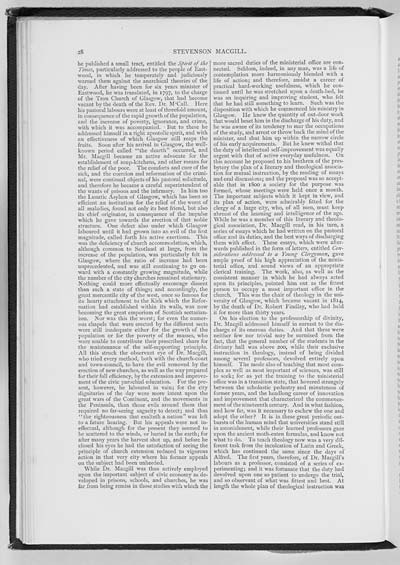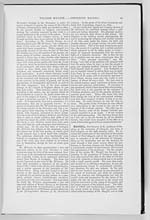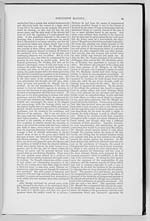28
he published a small tract, entitled the Spirit of the
Times, particularly addressed to the people of East-
wood, in which he temperately and judiciously
warned them against the anarchical theories of the
day. After having been for six years minister of
Eastwood, he was translated, in 1797, to the charge
of the Tron Church of Glasgow, that had become
vacant by the death of the Rev. Dr. M'Call. Here
his pastoral labours were at least of threefold amount,
in consequence of the rapid growth of the population,
and the increase of poverty, ignorance, and crime,
with which it was accompanied. But to these he
addressed himself in a right apostolic spirit, and with
an effectiveness of which Glasgow still reaps the
fruits. Soon after his arrival in Glasgow, the well-
known period called "the dearth" occurred, and
Mr. Macgill became an active advocate for the
establishment of soup-kitchens, and other means for
the relief of the poor. The comforts and cure of the
sick, and the coercion and reformation of the crimi-
nal, were continual objects of his pastoral solicitude,
and therefore he became a careful superintendent of
the wants of prisons and the infirmary. In him too
the Lunatic Asylum of Glasgow, which has been so
efficient an institution for the relief of the worst of
all maladies, found not only its best friend, but also
its chief originator, in consequence of the impulse
which he gave towards the erection of that noble
structure. One defect also under which Glasgow
laboured until it had grown into an evil of the first
magnitude, called forth his active exertions. This
was the deficiency of church accommodation, which,
although common to Scotland at large, from the
increase of the population, was particularly felt in
Glasgow, where the ratio of increase had been
unprecedented, and was still continuing to go on-
ward with a constantly growing magnitude, while
the number of the city churches remained stationary.
Nothing could more effectually encourage dissent
than such a state of things; and accordingly, the
great mercantile city of the west, once so famous for
its hearty attachment to the Kirk which the Refor-
mation had established within its walls, was now
becoming the great emporium of Scottish sectarian-
ism. Nor was this the worst; for even the numer-
ous chapels that were erected by the different sects
were still inadequate either for the growth of the
population or for the poverty of the masses, who
were unable to contribute their prescribed share for
the maintenance of the self-supporting principle.
All this struck the observant eye of Dr. Macgill,
who tried every method, both with the church-court
and town-council, to have the evil removed by the
erection of new churches, as well as the way prepared
for their full efficiency, by the extension and improve-
ment of the civic parochial education. For the pre-
sent, however, he laboured in vain; for the city
dignitaries of the day were more intent upon the
great wars of the Continent, and the movements in
the Peninsula, than those evils around them that
required no far-seeing sagacity to detect; and thus
"the righteousness that exalteth a nation" was left
to a future hearing. But his appeals were not in-
effectual, although for the present they seemed to
be scattered to the winds, or buried in the earth; for
after many years the harvest shot up, and before he
closed his eyes he had the satisfaction of seeing the
principle of church extension reduced to vigorous
action in that very city where his former appeals
on the subject had been unheeded.
While Dr. Macgill was thus actively employed
upon the important subject of civic economy as de-
veloped in prisons, schools, and churches, he was
far from being remiss in those studies with which the
more sacred duties of the ministerial office are con-
nected. Seldom, indeed, in any man, was a life of
contemplation more harmoniously blended with a
life of action; and therefore, amidst a career of
practical hard-working usefulness, which he con-
tinued until he was stretched upon a death-bed, he
was an inquiring and improving student, who felt
that he had still something to learn. Such was the
disposition with which he commenced his ministry in
Glasgow. He knew the quantity of out-door work
that would beset him in the discharge of his duty, and
he was aware of its tendency to mar the occupations
of the study, and arrest or throw back the mind of the
minister, and shut him up within the narrow circle
of his early acquirements. But he knew withal that
the duty of intellectual self-improvement was equally
urgent with that of active everyday usefulness. On
this account he proposed to his brethren of the pres-
bytery the plan of a literary and theological associa-
tion for mutual instruction, by the reading of essays
and oral discussions; and the proposal was so accept-
able that in 1800 a society for the purpose was
formed, whose meetings were held once a month.
The important subjects which it kept in view, and
its plan of action, were admirably fitted for the
clergy of a large city, who, of all men, must keep
abreast of the learning and intelligence of the age.
While he was a member of this literary and theolo-
gical association, Dr. Macgill read, in his turn, a
series of essays which he had written on the pastoral
office and its duties, and the best ways of discharging
them with effect. These essays, which were after-
wards published in the form of letters, entitled Con-
siderations addressed to a Young Clergyman, gave
ample proof of his high appreciation of the minis-
terial office, and sound views of an appropriate
clerical training. The work, also, as well as the
consistent manner in which he had always acted
upon its principles, pointed him out as the fittest
person to occupy a most important office in the
church. This was the chair of theology in the uni-
versity of Glasgow, which became vacant in 1814,
by the death of Dr. Robert Findlay, who had held
it for more than thirty years.
On his election to the professorship of divinity,
Dr. Macgill addressed himself in earnest to the dis-
charge of its onerous duties. And that these were
neither few nor trivial may be surmised from the
fact, that the general number of the students in the
divinity hall was above 200, while their exclusive
instruction in theology, instead of being divided
among several professors, devolved entirely upon
himself. The mode also of teaching that most com-
plex as well as most important of sciences, was still
to seek; for as yet the training to the ministerial
office was in a transition state, that hovered strangely
between the scholastic pedantry and minuteness of
former years, and the headlong career of innovation
and improvement that characterized the commence-
ment of the nineteenth century. And in what fashion,
and how far, was it necessary to eschew the one and
adopt the other? It is in these great periodic out-
bursts of the human mind that universities stand still
in astonishment, while their learned professors gaze
upon the ancient moth-eaten formulas, and know not
what to do. To teach theology now was a very dif-
ferent task from the inculcation of Latin and Greek,
which has continued the same since the days of
Alfred. The first years, therefore, of Dr. Macgill's
labours as a professor, consisted of a series of ex-
perimenting; and it was fortunate that the duty had
devolved upon one so patient to undergo the trial,
and so observant of what was fittest and best. At
length the whole plan of theological instruction was

![]() Universal Viewer |
Universal Viewer | ![]() Mirador |
Large image | Transcription
Mirador |
Large image | Transcription
![]()

